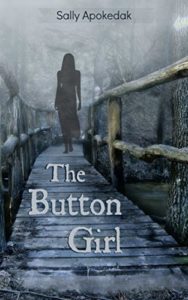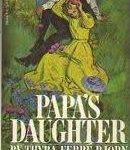The Button Girl—A Review
The Button Girl by Sally Apokedak is a digital young adult fantasy intended for the general audience. See excerpt here.
The Story
 Young Repentance Attwater has reached the age of “buttoning,” or marriage, but she lives in a breeder village under the control of the overlords. She decided years ago when she witnessed her brother taken away from his family into slavery that she would never bear children only to lose them to the overlords. Even if she had to go into slavery herself. Even if she’d be separated from her family, from her sister who she wanted so desperately to protect.
Young Repentance Attwater has reached the age of “buttoning,” or marriage, but she lives in a breeder village under the control of the overlords. She decided years ago when she witnessed her brother taken away from his family into slavery that she would never bear children only to lose them to the overlords. Even if she had to go into slavery herself. Even if she’d be separated from her family, from her sister who she wanted so desperately to protect.
When the day of the buttoning ceremony, Repentance must decide if she will follow through on her commitment or if she’ll become like her mother—contented, and powerless, in the face of the overlords’autocratic rule.
The Setting
 The Button Girl is set in a fanciful place, in an indeterminable time, where overlords rule lowborns, where some people live in the hot, swampy fog created by the hot springs and others live in the sun on the top of the mountain in the ice castle, where some have gifts of moon cloth and others have skimmers and still others have dragonsticks or sun cloth, but the overlords have taken control of it all.
The Button Girl is set in a fanciful place, in an indeterminable time, where overlords rule lowborns, where some people live in the hot, swampy fog created by the hot springs and others live in the sun on the top of the mountain in the ice castle, where some have gifts of moon cloth and others have skimmers and still others have dragonsticks or sun cloth, but the overlords have taken control of it all.
The land is appropriately “other” for a fantasy, and feels very real and vivid.
The Characters
The cast of characters in The Button Girl is not overwhelmingly large and each individual has clear, discernible motives. Repentance is the point of view character, and like many teens, she thinks she knows better than her parents. She may not be able to change the world, but she wants at least to gain some measure of control over her own circumstances. But she underestimated the effects of her choices. She didn’t know or understand all the factors, and in the end she must make a heart-wrenching choice that she never anticipated.
She’s a likeable character, and all along I found myself cheering for her and hoping that she’d found the path to safety and happiness.
The other characters remain true to form and each acts in understandable ways. Sober is a compelling character. The king is sympathetic and powerless, Comfort is vulnerable, the prince is selfish and greedy. They all act in ways that are true to their character. Together they create a story that is intriguing, to say the least.
The Plot
Repentance doesn’t want to have kids because she doesn’t want to give them up to the overlords. She doesn’t want to stand by idly as her own parents did when the overlords took their sons. She wants to protect her younger sister Comfort, but realizes she really can’t do anything to keep her safe. Against the helplessness of her life, Repentance decides to control the one thing within her power—she can refuse to button.
But to make that decision, she is dooming herself and her would-be button mate, to lives of slavery.
Only after her choice is irrevocable does she realize the ramifications of what she’s done—and the evil far outweighs the good.
Throughout her journey, Repentance struggles with why Providence has allowed the overlords to have control over the lowborn. Is Providence unfair? Or does He even exist? Why do her prayers seem to fall on deaf ears?
Repentance continues to act rashly, and one poor decision seems invariably to lead to another.
In the end, she knows what she should do, but does she have the strength of character to do it?
Recommendation
 The Button Girl may be a YA fantasy, but readers of all ages will be delighted with this story. It’s filled with gripping tension, engaging characters, a fantasy setting that comes to life, and above all a problem that is so relevant to our times.
The Button Girl may be a YA fantasy, but readers of all ages will be delighted with this story. It’s filled with gripping tension, engaging characters, a fantasy setting that comes to life, and above all a problem that is so relevant to our times.
Apokedak gives no easy answers, but she does put her character into a situation that forces her to choose, and in so doing she allows us to see more clearly what our responsibilities are today. It’s a brilliant way to address what our culture faces.
I give this book my highest recommendation. Readers of all stripes, but especially fantasy readers, will be thoroughly engaged throughout. This is a book you won’t want to miss.











































I’d be interested in a compare/contrast of this and “The Handmaid’s Tale.” Different genres and different focuses, of course, but with common elements of forced coupling and forced birthing.
I wonder if Apokedak ever touches on the possibility that Repentance may decide to never marry and never have children because those two ideas have too much emotional baggage and trauma attached to them. Is it me, or is deliberate childlessness weirdly controversial in Christian subculture? I get it on an intellectual level, but I have a hard time grokking on an emotional level why people should care if other people have children anymore than they should care if other people have an RV or whatever. Not your circus, not your monkeys, yanno?